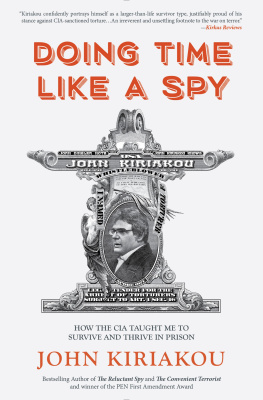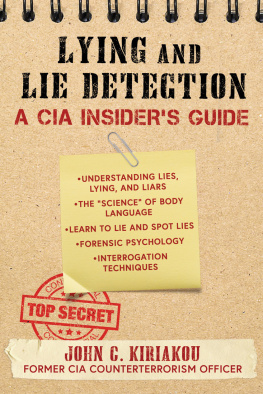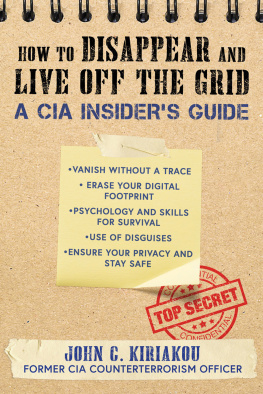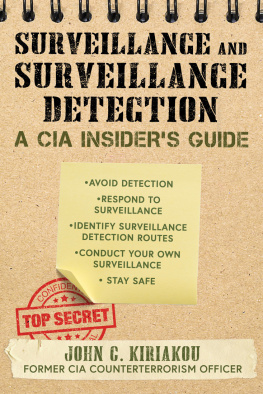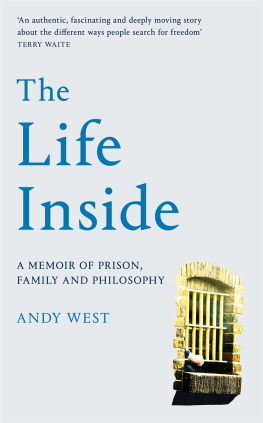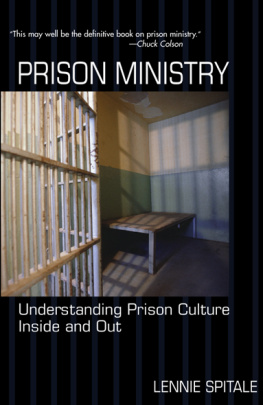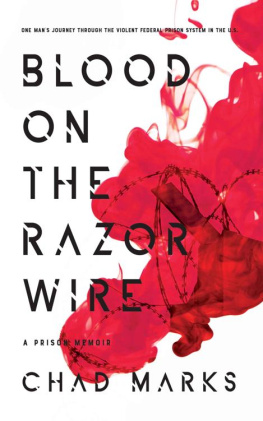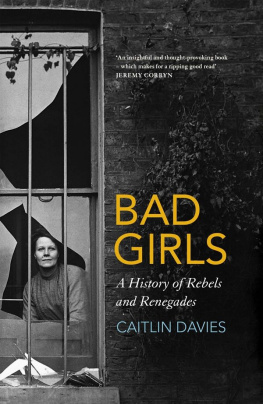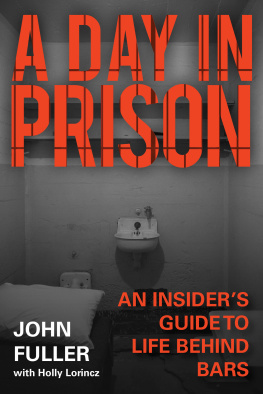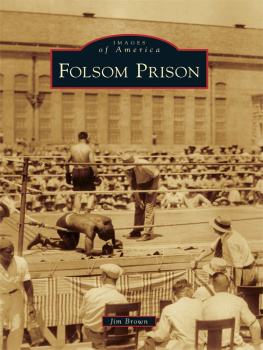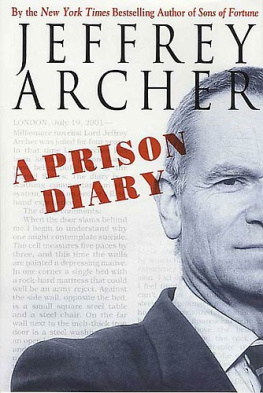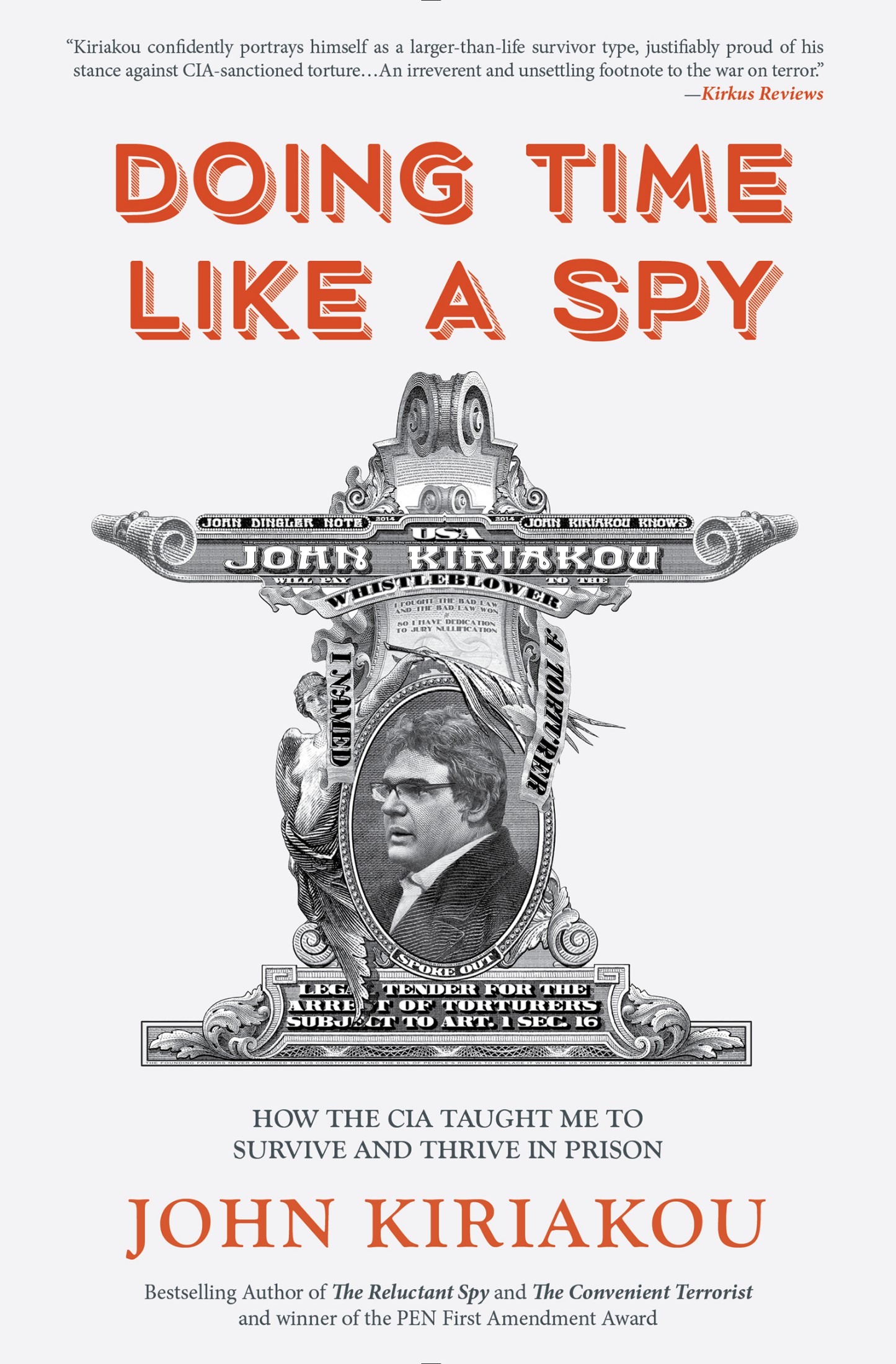This is a Genuine Vireo Book
A Vireo Book | Rare Bird Books
453 South Spring Street, Suite 302
Los Angeles, CA 90013
rarebirdbooks.com
Copyright 2017 by John Kiriakou
All rights reserved, including the right to reproduce this book or portions thereof in any form whatsoever, including but not limited to print, audio, and electronic. For more information, address: A Vireo Book | Rare Bird Books Subsidiary Rights Department, 453 South Spring Street, Suite 302,
Los Angeles, CA 90013.
Set in Minion Pro
epub isbn : 978-1-945572-74-6
Whistleblower John Kiriakou is number six in a series of ten works of art that John Dingler calls Prosecuted Whistleblowers. Not all of them were prosecuted and not all were whistleblowers, however, their contributions toward whistleblowing are significant enough to be included in the group: Philip Agee, Daniel Ellsberg, Julian Assange, Jeremy Hammond, Thomas Drake, John Kiriakou, Jeffrey Sterling, Aaron Swartz, Chelsea Manning, Edward Snowden.
johndinglerart.com
(Philip Agee served as a role model for other whistleblowers;
Jeremy Hammond and Aaron Swartz were facilitators.)
10 9 8 7 6 5 4 3 2 1
Publishers Cataloging-in-Publication data
Names: Kiriakou, John, author.
Title: Doing time like a spy : how the CIA taught me how to survive and thrive in prison / John Kiriakou.
Description: First Hardcover Edition. | A Genuine Vireo Book | New York, NY; Los Angeles, CA: Rare Bird Books, 2017.
Identifiers: ISBN 9781945572418
Subjects: LCSH Kiriakou, John. | United States. Central Intelligence AgencyOfficials and employeesBiography. | SpiesUnited StatesBiography. | Whistle blowingUnited States. | PrisonsUnited States. | PrisonersUnited StatesBiography. | BISAC BIOGRAPHY & AUTOBIOGRAPHY / Personal Memoirs | BIOGRAPHY & AUTOBIOGRAPHY / Law Enforcement | BIOGRAPHY & AUTOBIOGRAPHY / Political.
Classification: LCC HV9468 .K57 2017 | DDC 365/.6/0924dc23
For my brother and sister, Emanuel Kiriakou and Tina Moulis,
and for my father-in-law, Dr. Michael Armentrout.
Thanks for everything.
Every current and former CIA officer must submit his book manuscript to the CIAs notorious and politicized Publications Review Board (PRB) for clearance to ensure that the book does not contain classified information. Well, every current and former CIA officer is supposed to submit the manuscript. Many dont. The ones who are famous or who are friends with the president get away with it. The little guy who doesnt ends up getting crushed in a court of law. I submitted my manuscript. And despite the fact that the federal courts have mandated that the CIA has thirty days to review it, my book took more than eight months. Still, I played by the rules, even if the CIA didnt.
In the end, the CIA necessitated the following disclaimer:
This does not constitute an official release of CIA information. All statements of fact, opinion, or analysis expressed are those of the author and do not reflect the official positions or views of the Central Intelligence Agency (CIA) or any other US Government agency. Nothing in the contents should be construed as asserting or implying US Government authentication of information or CIA endorsement of the authors views. This material has been reviewed solely for classification.
Contents
Day 1: This Has to be Some Kind
of Mistake
The Guardian: Obamas Abuse of the Espionage Act is
Modern-Day McCarthyism
Introduction
I like to think that Im a pretty nice guy. In fact, people tell me all the time that Im friendly and easy to get along with. I consider myself a good father, a good husband, a hard worker, and a patriot.
But in prison I had a reputation for being an asshole. I was comfortable in prison plotting against people, cutting off those who crossed me, and trying, constantly, to stay one step ahead of the Corrections Officers (COs) and the prison administration.
I am an experienced, highly trained former CIA operations officer. It was my job to recruit spies to steal secrets and to run counterterrorist operations to break up and foil terrorist plots. Im very proud of my CIA career. I spent nearly fifteen years there, and I played a role in the countrys response to the September 11, 2001, attacks. I spent the first eight years of my CIA career working in analysis and specializing on Iraq. My final seven years were spent on the ground in counterterrorism. I resigned from the CIA in 2004.
Despite my career, which included a later stint as the senior investigator for the Senate Foreign Relations Committee, and nearly a half-century of being a law-abiding citizen, I eventually found myself as the target of a federal investigation. At the end of the ordeal I was sentenced to thirty months in prison.
I was determined to get through my prison experience unscathed, and I thought the best way to do that would be to rely on what the CIA had taught me over the years. After all, prison couldnt possibly be tougher than Afghanistan, Pakistan, Iraq, Yemen, or any of the other dumps in which Id served over the years. I resolved to make the best of a bad situation, to stay safe, and to make sure that I remained at the top of the social heap.
When I came to prison, I didnt know what to expect. Nobody among my friends had ever been to prison, and I had nothing to go on other than what I had seen on TV. What I did not expect, however, was that the training and experience that I had amassed in my CIA career would prepare me to survive and thrive in prison. As you will see, I wasnt the typical federal prisoner.
A CIA psychiatrist once told me that the Agency looks to hire people who exhibit sociopathic tendencies. CIA recruiters are not interested in sociopaths, who have no consciences or empathy, and who can easily pass a polygraph exam. Sociopaths are too hard to control. Instead, they are interested in people who are comfortable working in ethical, moral, and legal grey areas. I had no problem bending some rules if it was in the interest of national security.
Some researchers have gone further in their analysis of the typical CIA officer than the CIA psychiatrist who told me about sociopathic tendencies. New Mexico State University professor Peter Jonason published a paper entitled Who is James Bond? which found that successful intelligence officers have a specific triumvirate of personality traitsthe stratospheric self-esteem of narcissism; the fearlessness, ruthlessness, impulsivity, and thrill-seeking of psychopathy; and the deceitfulness and exploitativeness of Machiavellianism. Thats a little harsh. An actual psychopath or sociopath, according to Dutton, seeks reward at any cost, flouting consequence and elbowing risk aside. Thats not at all what a CIA officer does. He tries to get the job done while not making waves or attracting undue attention. Thats exactly what I did in prison.
The CIA recruited me in graduate school in the late 1980s for a reason. I was, and remain, very patriotic, and I was very interested in public service. I also had a bachelors degree in Middle Eastern Studies and a masters degree in legislative affairs, as well as a facility for foreign languages. A retired CIA officer teaching at my alma mater, George Washington University, spotted me, made a few introductions, and, after a battery of tests and a comprehensive background investigation, I found myself at CIA headquarters in Langley, Virginia.

